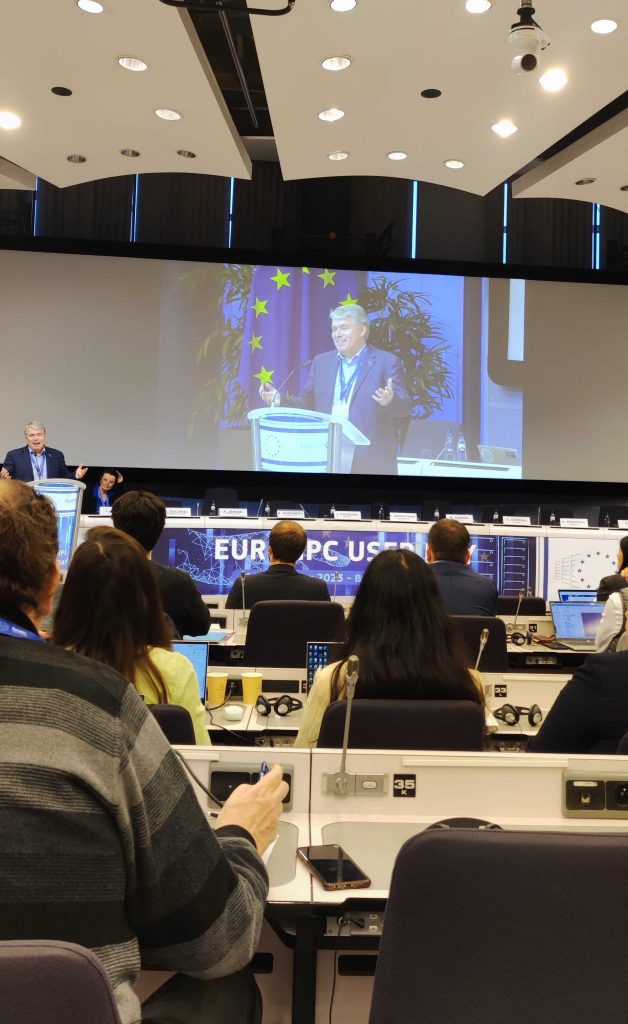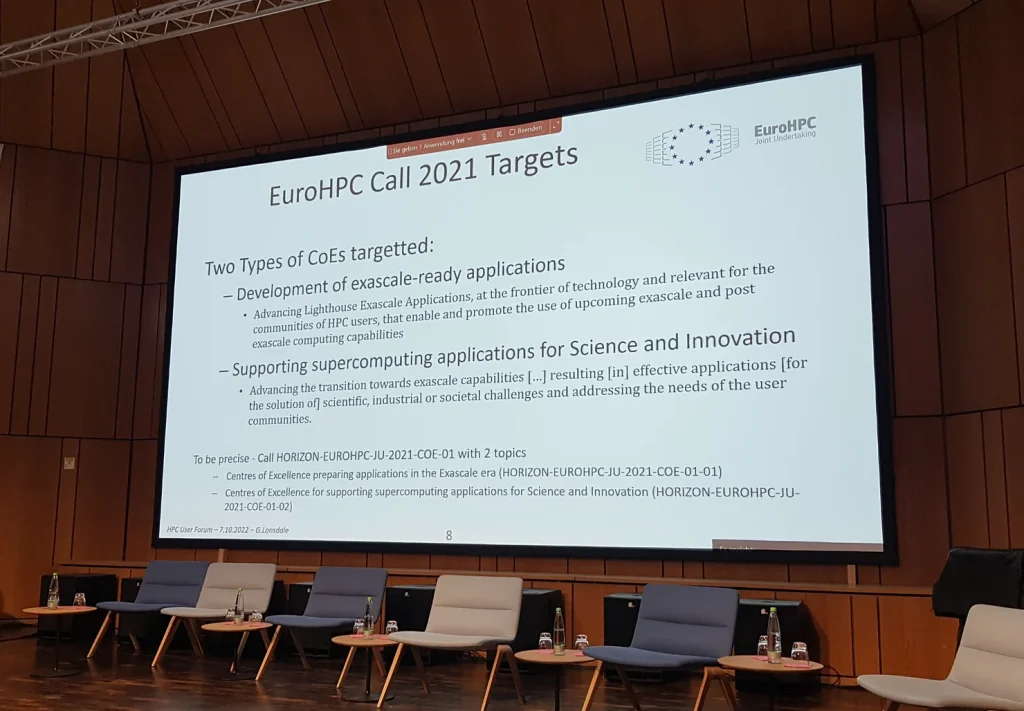11 December 2023
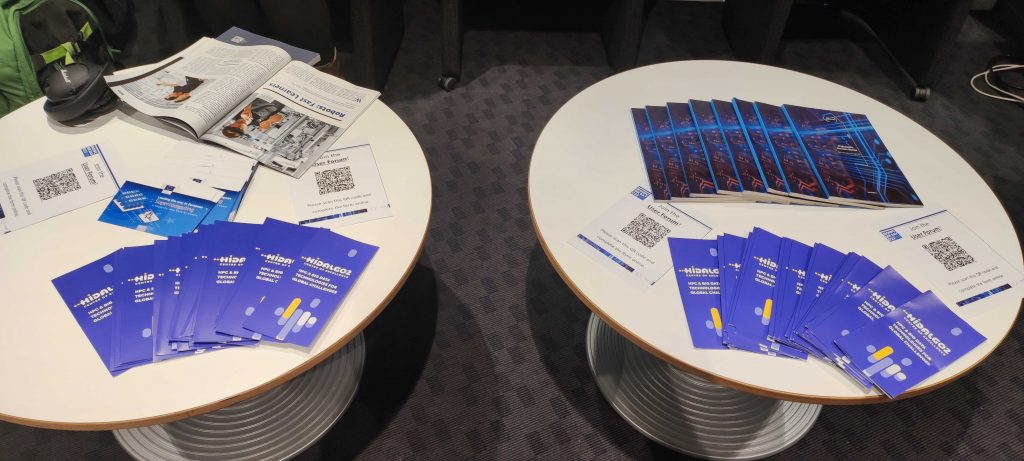
HiDALGO2 was present at the EuroHPC User Day taking place in Brussels, on 11th December 2023 and organised by the EuroHPC Joint Undertaking. The event hosted more than 50 speakers from different fields that use supercomputer performance to improve the capacity of computing their models. HiDALGO2 was represented by our partner Cemosis, namely by Maryam Maslek and Patrick Lemoine who kindly shared with us a full report on the interesting discussions and presentations conducted during the event.
The plenary session included presentations of the most powerful European supercomputers: Petascal (VEGA, DISCOVERER, MELUXINA, DEUCALION, KAROLINA), pre-Exascale (LUMI, LEONARDO, MARENOSTRUM 5) and Exascale (JUPITER). Namely, JUPITER will be the first EuroHPC Exascale supercomputer. The system will be located at the Forschungszentrum Jülich campus in Germany and operated by the Jülich Supercomputing Centre. HiDALGO2 uses supercomputer capacity to improve the computation time and results of the different simulations and for storage of the input and output big data.
Interesting HPC news
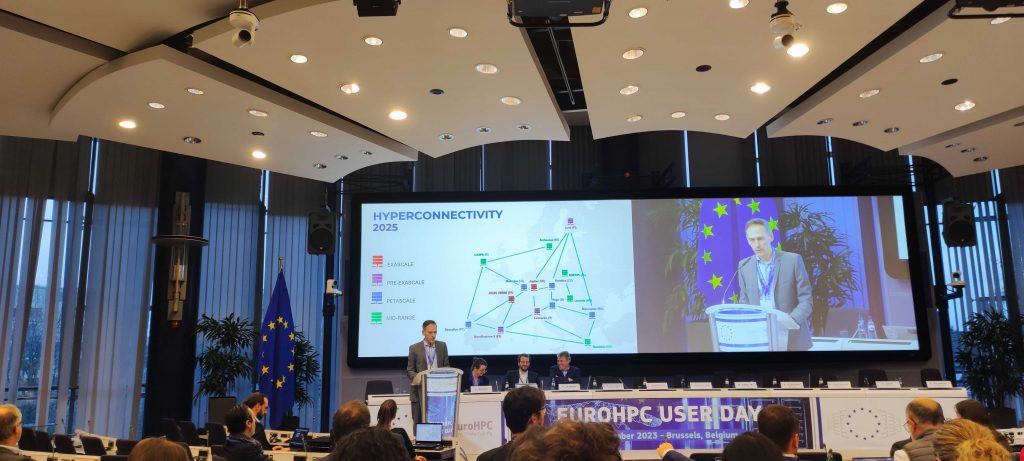
Among other interesting points that were discussed and presented during the conference were:
• EuroHyPerCon project which aims to create both federated and secure HPC services and data infrastructure and quantum computing ecosystem.
• National Competence Centers for High-Performance Computing (NCCs) represent a focal point of HPC, facilitating access of national stakeholders to European HPC competencies and opportunities in different industrial sectors and domains. For more read here.
• There is an open Call (27/02/2024) for “AI Support Centers”. The funding is up to 10 million € and the aim is to transfer advanced HPC-AI knowledge to the European AI user and developer communities.
• EuroHPC Training Initiatives: EUMaster4HPC is a training platform with an accessible archive of courses, learning materials, and events.
• Centers of Excellence for HPC Applications (CoEs): The main objective is to address the skills gap in computational science in the targeted domains by specialised pieces of training for increased adoption of advanced HPC in industry and academia.
• The EuroHPC Quantum (HPCQS) project aims to integrate two quantum simulators, each controlling about 100+ quantum bits (qubits) in two already existing supercomputers.
• There is a continuously open Call (for “Regular Access”) with 3 cut-off dates per year: March, July, and November. The available resources are on petascale and pre-exascale systems and are intended for projects that require large-scale HPC resources. The peer-review process duration is 4 months.
• There is a continuously open Call for “Extreme Scale Access with 2 cut-off dates per year: April, and October. The available resources on pre-exascale systems are intended for high-impact and, high-gain projects that require extremely large HPC resources. The peer-review process duration is 6 months.
• Destination Earth is a flagship initiative that develops a digital twin of the Earth to model, monitor, and simulate natural phenomena, hazards, and associated human activities. In 2024 the development of the core service platform (ESA), the data lake (EUMETSAT), the digital twin engine, and the first two digital twins on weather will include extreme events and climate change adaptation (ECMWF). In 2027 there will be initial and ramp-up operations, consolidation, maintenance, and continuous evolution of DetinE System. In 2030, the transition to long-term operations will be performed. Read more on this here.
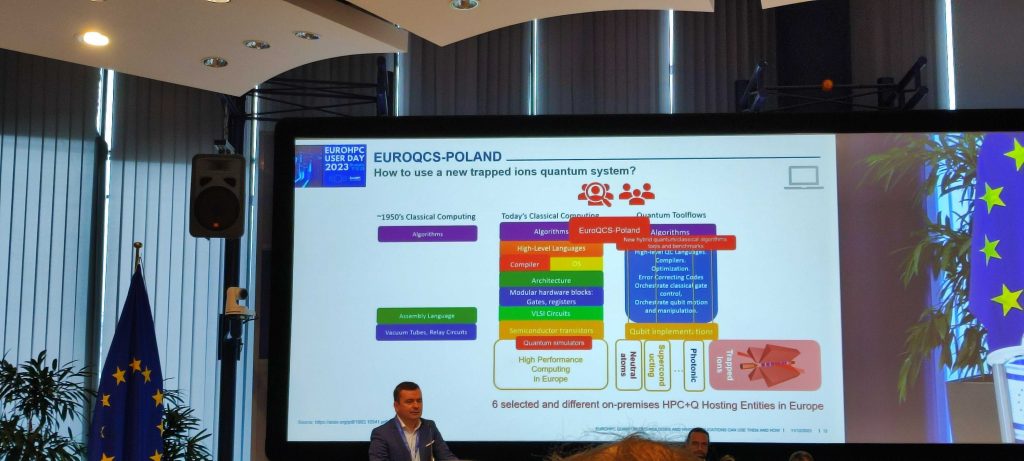
What about Quantum technologies?
In the area of quantum technologies, there are 6 new EuroHPC quantum supercomputers: 1) LUMI-Q will be integrated into the supercomputer Karolina at the IT4Innovations National Supercomputing Centre, 2) EuroQCS-France will be driven by GENCI. The quantum computer will be installed in TGCC, one of the three national computing centres operated by CEA in France, where it will be coupled to the supercomputer Joliot-Curie first and then to the upcoming exascale supercomputer conveyed by the Jules Verne consortium, 3) Euro-Q-Exa will be hosted at the LRZ and integrated into the Centre’s infrastructure, one of the three national supercomputing centers of the Gauss Centre for Supercomputing (GCS), where it will be integrated into the LRZ leadership-class supercomputer, currently SuperMUC-NG, 4) EuroQCS-Italy will be hosted in the data center of CINECA and integrated into the pre-exascale supercomputer Leonardo, 5) EuroQCS-Poland will be hosted at the (PSNC) and integrated into the Centre’s infrastructure, 6) EuroQCS-Spain will be integrated into the MareNostrum 5 supercomputer at the Barcelona Supercomputing Center. The EuroQCS project aims to create a federated European infrastructure for hybrid quantum-classical computing with remote access to QCS devices. Fundamental differences between the two computing paradigms must be bridged in order to achieve successful integration.
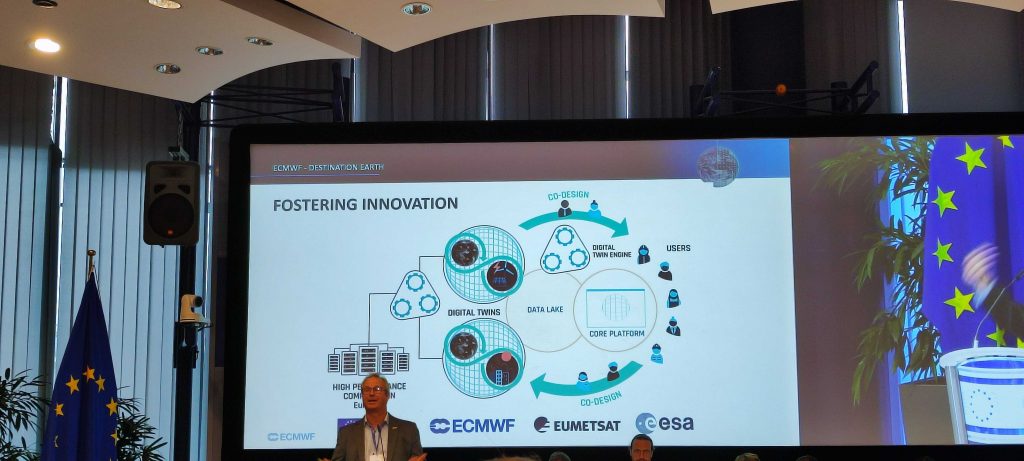
Computer and AI Sessions
During the conference, there were several computer and artificial intelligence sessions. To name a few, there were presentations of EXCELLERAT, FEniCS computing platform, Tinker HPC. Quantum ESPRESSO, MultiXscale, and XDEM. In the area of AI, we had Xena Vision, EuroVoc, Training acoustic models (Wav2Vec, BERT, Whisper, VoxRex swedish wave2vec, a Swedish speech-to-text module), eTranslation which is actually the European Commission’s Machine Translation system that we can use for texts in common formats.
